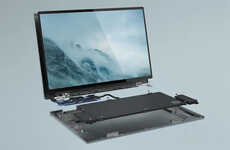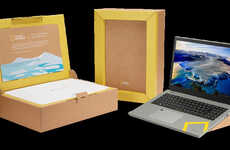
Unicef Debuts Solar-Powered Digital Drums
Parul Rohatgi — November 1, 2011 — Eco
References: unicef.org & oafrica
Living in a wired and connected world, it is difficult to imagine that only 10% of Ugandans have access to the Internet, but UNICEF is trying to increase the country's access to modern technology and information by using innovative, low-cost technology to create Digital Drums.
The sturdy, low-cost, solar-powered computer is made of local materials, predominantly metal oil drums. The welded oil drum computers also come with solar panels, waterproof keyboards, low cost laptops and of course, pre-loaded content. The objective is to put them in remote villages and towns where schools have few full-time teachers. Ultimately, the hope is that these solar-powered digital oil drum computers can provide information to students, increasing the amount of children receiving a fair education in rural Uganda.
The sturdy, low-cost, solar-powered computer is made of local materials, predominantly metal oil drums. The welded oil drum computers also come with solar panels, waterproof keyboards, low cost laptops and of course, pre-loaded content. The objective is to put them in remote villages and towns where schools have few full-time teachers. Ultimately, the hope is that these solar-powered digital oil drum computers can provide information to students, increasing the amount of children receiving a fair education in rural Uganda.
Trend Themes
1. Low-cost Solar Technology - Exploring the use of solar energy as a means to provide affordable and sustainable technology access to underserved communities.
2. Innovative Hardware Design - Revolutionizing the use of local materials to construct durable and adaptable hardware devices with a focus on remote and off-grid areas.
3. Digital Education for Rural Communities - Creating digital platforms to increase education access and quality in remote and sparsely populated regions.
Industry Implications
1. Renewable Energy - Leveraging the power of solar energy to optimize energy consumption and provide affordable power solutions for the population residing in rural and remote regions.
2. Hardware Manufacturing - Developing the manufacturing of durable and low-cost hardware focusing on constructing devices using locally available materials to provide technology access to marginalized populations.
3. Edtech - Using technology to enhance the quality of education in off-grid and rural regions, developing digital solutions that are accessible, affordable and effective.
4.9
Score
Popularity
Activity
Freshness























